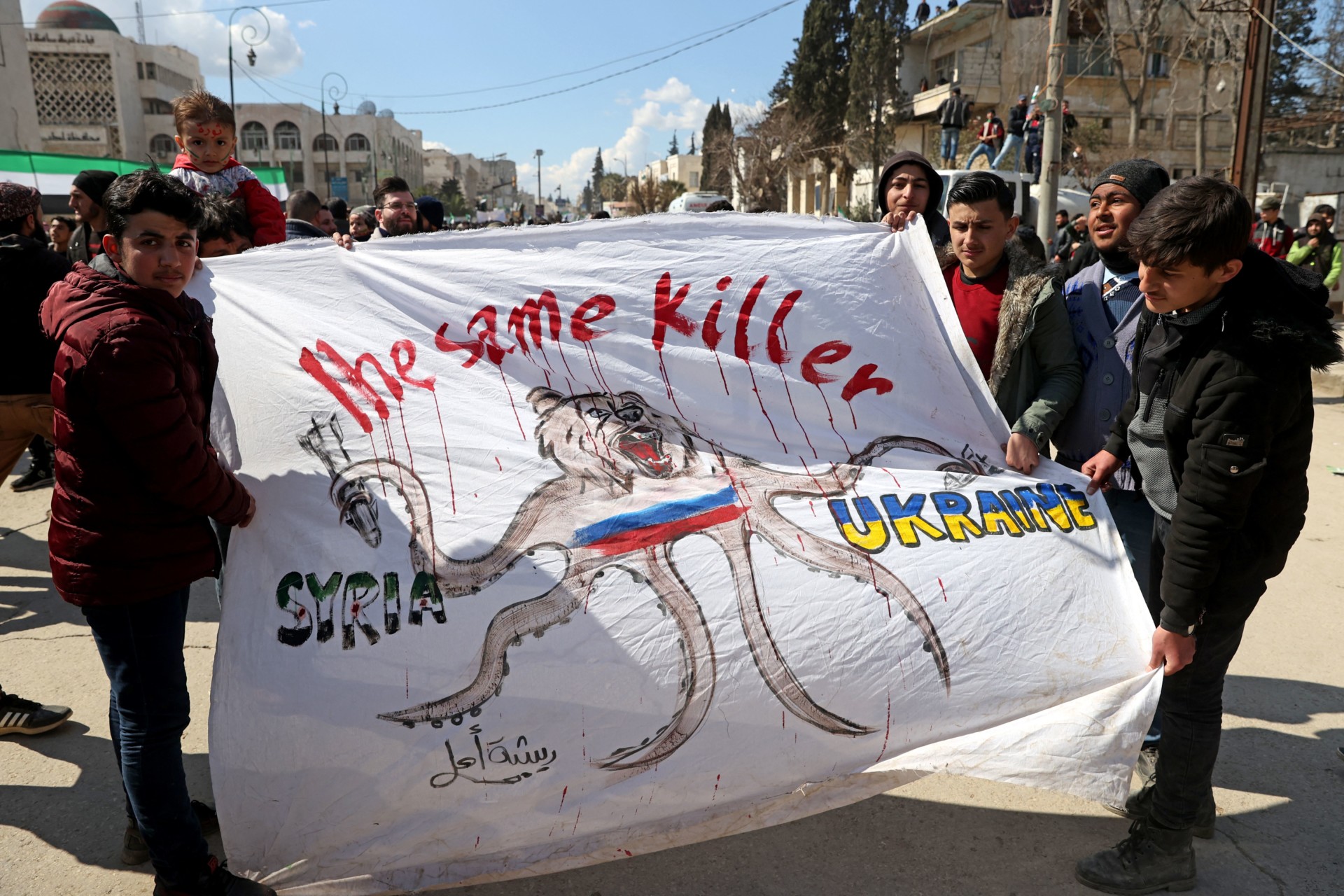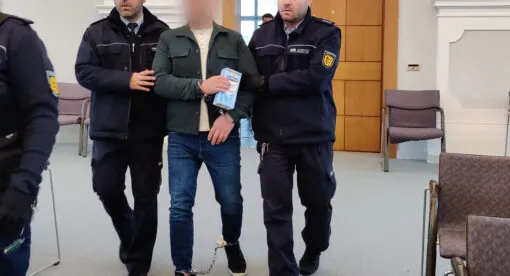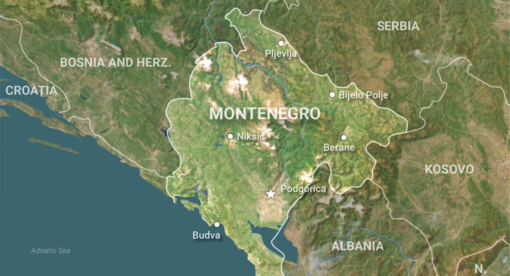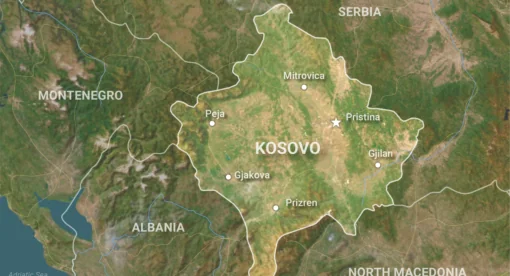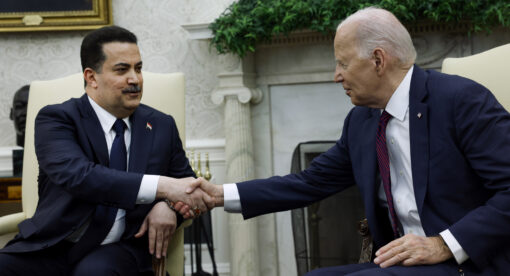Russian President Vladimir Putin has forthrightly declared himself open to the prospect of Syrian mercenaries partaking in what he has called the liberation of Ukraine from Nazis (including a Jewish president) and other genocidal maniacs. Why not?
Syria is where Putin’s forces trained for Ukraine, perfecting the practice of bombing hospitals. Syria is the place where the West, following Washington’s lead, rehearsed its lines about fearing World War III more than anything else, thereby encouraging Putin and his Syrian client to do as they pleased to defenseless civilians. Syria is the place where President Bashar al Assad, encouraged by Putin, went on a decade-long spree of war crimes and crimes against humanity whose results in terms of death, disease, displacement, and destruction – both physical and spiritual – dwarf what has happened to date in Ukraine. To recruit armed backers of Assad to partake in the sacking of Ukraine is perfectly in keeping with what Assad and Putin have already done to Syria.
In truth, however, a few hundred or even several thousand Syrian mercenaries will not measurably affect the military outcome in Ukraine. They would most likely be used in ground assaults to test Ukrainian defenses, sparing Russian forces the casualties Putin wishes, for political reasons, to avoid. Those who survive these suicidal missions would, no doubt, be permitted to help themselves to the spoils of war in occupied Ukrainian population centers. But the arrival of Syrian mercenaries on the battlefield will neither turn tides nor produce decisive military outcomes.
Their arrival will, however, mark Assad’s official, explicit secession from the international community. Putin, as noted elsewhere by this writer, is the embodiment of what collective security systems – starting with the 19th century Concert of Europe and represented by the United Nations until May 24, 2022 – were designed to prevent. If one can imagine Napoleon Bonaparte returning a second time to lead France after the 1815 Congress of Vienna or Adolf Hitler guiding the deliberations of the League of Nations, one can understand the impact of Putin residing at the heart of the U.N. system in the Security Council. Assad is merely his apprentice. But by materially supporting the threat to the peace mounted by Putin and by joining Putin’s renunciation of the collective security system established in San Francisco in 1945, Assad has separated Syria from the family of nations as Putin has separated Russia.
In retrospect, Assad has long been an accessory – conscious or not – to Putin’s plan to break the postwar collective security system decisively. The sheer volume of his atrocities has made a mockery of “Never Again” and emptied “Responsibility to Protect” of any meaning. Although chemical weaponry accounts for under 1 percent of those Syrians murdered by Assad’s forces over the past 11 years, it is instructive that both the Assad regime and Russia have denied they were ever used. Reports that Putin may use chemicals on Ukrainians should be taken very seriously indeed. He and Assad appreciate fully the terror associated with unprotected people’s inability to breathe.
Indeed, the state terror Russians are inflicting on their Slavic brothers has imprinted on the minds of hundreds of millions of people around the world the sheer horror of war being waged deliberately on defenseless civilians. The suffering of Ukrainians has imprinted on mankind – especially perhaps in the West – an impression that the slaughter of Syrians never has.
It is interesting to watch and listen to media commentators as they articulate, often quite eloquently and with genuine shock, their discovery in Ukraine of what happens to innocent human beings when a state turns its enormous firepower on children and on those trying to protect them. It will be no consolation to Ukrainians to know that the needless shedding of their blood is educating the world.
For Syrians, left unprotected and largely unnoticed despite hundreds of thousands of deaths, 6 million refugees, another 6 million people internally displaced, countless injuries, untold trauma, weaponized disease, torture, rape, and starvation, the attention being lavished on Ukrainians no doubt produces mixed reactions. Some may ask, “Are we insufficiently blonde to merit the world’s attention? Did our Muslim faith disqualify us from protection? Did the depredations of a yet another violently incompetent Arab leader simply strike the world as business as usual?” Yet others, while mourning the deaths of Ukrainian children as they have mourned their own, will welcome the opening of eyes to the horrific consequences of state terror.
The shamefully gratuitous abandonment of Syria by a drifting, leaderless West cannot be undone, although there will no doubt be new opportunities to protect defenseless Syrian civilians and demand that diplomatic normalization with a mass murderer – someone now eager to dispatch armed mercenaries to Ukraine – be reversed. Nothing can undo the suffering enabled by the failure of the West to protect people deliberately targeted by artillery barrages, barrel bombs, and chemical munitions. Still, there are lessons to be learned applicable both to Ukraine and Syria.
After Russia’s military intervention in Syria in September 2015, the informal U.S. excuse for leaving Syrian civilians unprotected shifted from some variation of, “Oh, if we lift a finger to suppress Assad’s air force it will lead to invasion and occupation just like Iraq,” to, “Oh, if we lift a finger to protect Syrians from mass murder it could, due to the presence of Russian forces, lead to World War III.” By retaliating twice in the wake of Assad regime chemical assaults, the Trump administration disproved the World War III thesis. But it has made a full comeback in the Ukraine crisis.
One need not advocate Western military intervention in Ukraine or play fast and loose with potential nuclear war to see how gratuitous and increasingly promiscuous talk of a potential World War III by U.S. leaders can produce thoroughly unintended but totally destabilizing consequences. There is nothing wrong with thinking and concluding that U.S. boots on the ground in Ukraine or U.S. aircraft in the skies over Ukraine could escalate matters significantly between Washington and Moscow, and perhaps not even produce the desired results in Ukraine. But saying it – publicly and repeatedly – can, given the nature of Hitler’s successor as the threat to global peace, be dangerous.
Imagine the impact of these words on Putin’s brain. “The Americans feared nuclear war starting over an armed incident in Syria, and now they have articulated the same fear over Ukraine. If this fear is foremost in their minds, would they be willing to confront me anywhere? If they find Russian-American confrontation in Syria and Ukraine inadmissible, would they also find it so in Poland, Romania, and the Baltic states? What, after all, is the difference? NATO’s Article 5? Is that worth nuclear war in the eyes of Washington? I have my hands full with Ukraine right now – I can even use some Syrian mercenaries. But, when the time is right for me, will the Americans fight to defend their eastward expansion of NATO? Not if they think it will lead to nuclear war!”
Putin need not be emotionally unstable to reach such a conclusion. But it would be extraordinarily dangerous for him to do so. The view here is that the United States and its NATO allies would indeed fight to uphold the territorial integrity of all NATO members; they would defeat Russian invaders and would risk nuclear war in so doing. If Putin is to be deterred from undertaking armed adventures beyond Ukraine, he must be certain that he will encounter the full force of U.S.-led NATO conventional military capabilities. For U.S. leaders repeatedly to highlight an overriding fear of World War III risks sending the opposite message to Putin: that, at the end of the day, the United States will avoid a direct military confrontation with Russia anywhere and at all costs.
Given these stakes, the dispatch of Syrian mercenaries to Russia for use in the ravaging of Ukraine is something of relatively little significance. But it is a reminder of how the weakness of the West in Syria in the face of elaborately extensive war crimes encouraged Putin to seize Crimea. It is a reminder of how Putin has processed a weak response to Crimea and a conflict avoidance at all costs approach by Washington and the West in Syria as he weighed invading the balance of Ukraine. He need not be encouraged further along these lines. He will do what he will with Assad supporters seeking a paycheck and loot. But – as we arm Ukrainians and strengthen NATO – let us not mislead him about our readiness to fight him if necessary and beat him thoroughly. Anything less runs the risk of inadvertently bringing about precisely the result that all humanity should wish to avoid.
Ambassador Frederic C. Hof is a professor at Bard College and the author of the forthcoming Reaching for the Heights: The Inside Story of a Secret Attempt to Reach a Syrian-Israel Peace (United States Institute of Peace).
The views expressed in this article are those of the author and not an official policy or position of the New Lines Institute.

